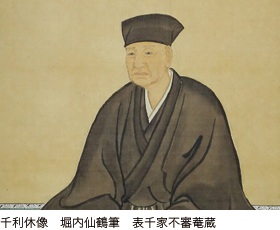戦国武将と茶陶
Warlords and Tea Utensils
Back
千利休と戦国武将
SEN no Rikyū and Warlords
SEN no Rikyū and Warlords

千利休は、大阪堺の魚問屋に生まれました。
室町時代の堺は、「納屋衆」と呼ばれる有力商人の合議により都市運営がなされており、茶の湯が流行していました。納屋衆の一人であった利休は、茶の湯に親しみ、茶道の祖といわれる村田珠光や武野紹鴎に「侘び茶」を学び、信長の茶頭になりました。信長の時には、今井宗久や津田宗及に次ぐ三番手の茶頭でした。
しかし、秀吉が天下を取ると、信長にあまりにも近かった宗久は疎まれ、代わって利休が茶頭の筆頭として取り立てられました。その後、秀吉に重用された利休は、正親町天皇からこの「利休」という居士名を賜るなど、名実ともに天下一の茶人となって「侘び茶」を大成しました。
また、秀吉の茶頭としての地位から、武将からも一目置かれる存在となり、政治的にも非常に大きな力をもっていたといわれています。「内々の儀は、宗易、公の儀は宰相(プライベートなことは利休に、公のことは豊臣秀長(秀吉の異父弟)に)」といわれるほどでした。
室町時代の堺は、「納屋衆」と呼ばれる有力商人の合議により都市運営がなされており、茶の湯が流行していました。納屋衆の一人であった利休は、茶の湯に親しみ、茶道の祖といわれる村田珠光や武野紹鴎に「侘び茶」を学び、信長の茶頭になりました。信長の時には、今井宗久や津田宗及に次ぐ三番手の茶頭でした。
しかし、秀吉が天下を取ると、信長にあまりにも近かった宗久は疎まれ、代わって利休が茶頭の筆頭として取り立てられました。その後、秀吉に重用された利休は、正親町天皇からこの「利休」という居士名を賜るなど、名実ともに天下一の茶人となって「侘び茶」を大成しました。
また、秀吉の茶頭としての地位から、武将からも一目置かれる存在となり、政治的にも非常に大きな力をもっていたといわれています。「内々の儀は、宗易、公の儀は宰相(プライベートなことは利休に、公のことは豊臣秀長(秀吉の異父弟)に)」といわれるほどでした。
SEN no Rikyū was born into a family of wealthy fish wholesalers in the city of Sakai (now Osaka prefecture).
During the Muromachi period (1392-1573) Sakai was an autonomous city, ruled by a council of powerful merchants, known as the Nayashū, and the tea ceremony was extremely popular there. Rikyū was a member of the Nayashū and also skilled at the tea ceremony, having studied the wabicha-style of tea under MURATA Jukō, who is famous as the founder of the tea ceremony, and TAKENO Jōō. He later became a tea master for ODA Nobunaga and was recognized as being the third master, after Imai Sōkyū and TSUDA Sōgyū.
However, once Hideyoshi came into power he considered Sōkyū to have been too close to Nobunaga so he set him aside in favor of Rikyū. Having become important to Hideyoshi, he received the Buddhist lay name and title ‘Rikyū Koji’ from Emperor ŌGIMACHI, etc., and became the leading practitioner of the tea ceremony in both name and reality, raising the wabicha-style to preeminence.
In addition, his position as Hideyoshi’s tea master meant that he was respected by the leading generals of the period and is said to have become very powerful politically, so much so that people used to say ‘For private matters, Rikyū, for public matters, Hideyoshi’.
During the Muromachi period (1392-1573) Sakai was an autonomous city, ruled by a council of powerful merchants, known as the Nayashū, and the tea ceremony was extremely popular there. Rikyū was a member of the Nayashū and also skilled at the tea ceremony, having studied the wabicha-style of tea under MURATA Jukō, who is famous as the founder of the tea ceremony, and TAKENO Jōō. He later became a tea master for ODA Nobunaga and was recognized as being the third master, after Imai Sōkyū and TSUDA Sōgyū.
However, once Hideyoshi came into power he considered Sōkyū to have been too close to Nobunaga so he set him aside in favor of Rikyū. Having become important to Hideyoshi, he received the Buddhist lay name and title ‘Rikyū Koji’ from Emperor ŌGIMACHI, etc., and became the leading practitioner of the tea ceremony in both name and reality, raising the wabicha-style to preeminence.
In addition, his position as Hideyoshi’s tea master meant that he was respected by the leading generals of the period and is said to have become very powerful politically, so much so that people used to say ‘For private matters, Rikyū, for public matters, Hideyoshi’.
【 利休書簡 】
[作家名]千利休
[作品名]書状_本紙
[所蔵先名] 東京国立博物館
[クレジット表記] Image: TNM Image Archives
[作家名]千利休
[作品名]書状_本紙
[所蔵先名] 東京国立博物館
[クレジット表記] Image: TNM Image Archives